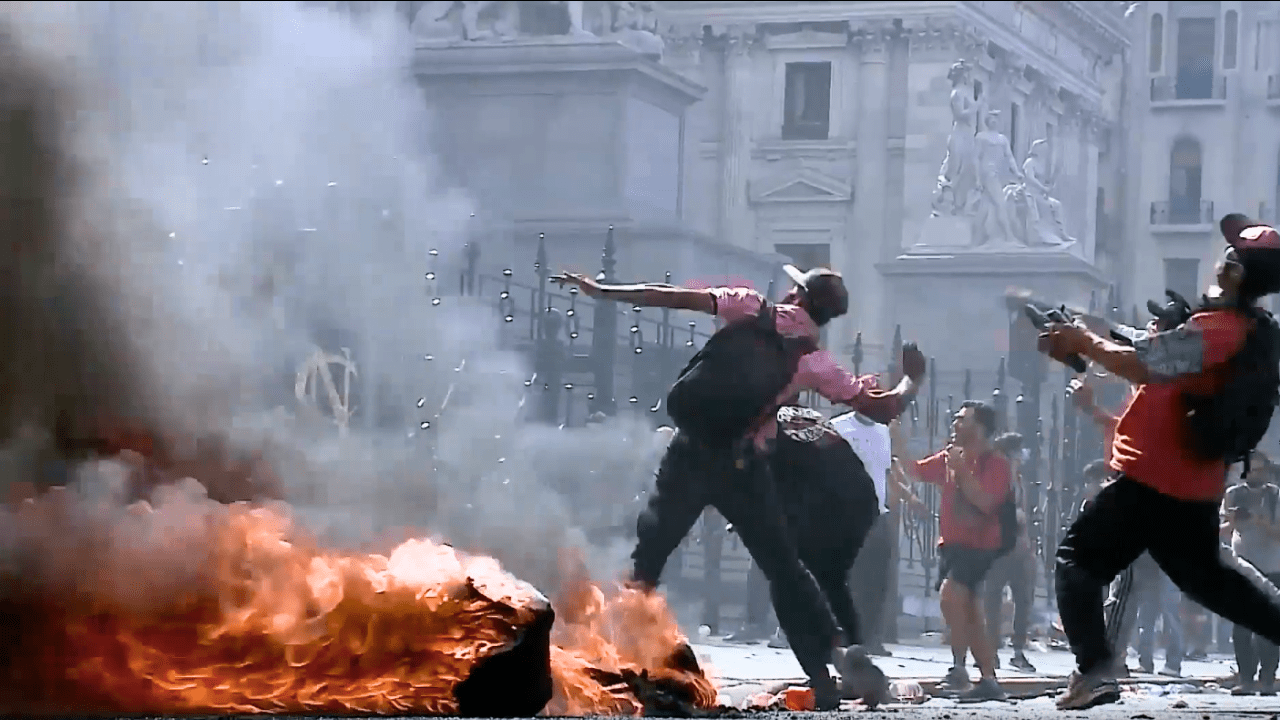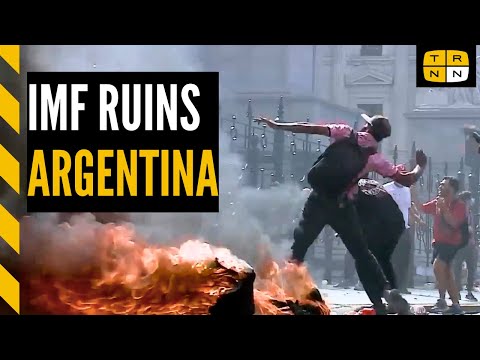The International Monetary Fund (IMF) and World Bank have a long history of plunging Global South nations into unsustainable cycles of debt. For Argentina, this process has been ongoing for decades, and is now reaching a breaking point. Since 2015, the Argentine peso has lost 80% of its value against the US dollar, leading to a cost of living crisis affecting a wide swath of society. The economic shock of the pandemic and the latest $44 billion IMF loan package delivered in 2022 have only made matters worse. In the second half of 2020, more than 40% of Argentinians were in poverty. The Real News reports from Buenos Aires as labor unions and other workers’ organizations fight for better wages, working conditions, and an end to austerity.
This story, with the support of the Bertha Foundation, is part of The Real News Network’s Workers of the World series, telling the stories of workers around the globe building collective power and redefining the future of work on their own terms.
Producer: Martin Varese, Leonardo Erhardt
Videographer: Fernanda Perez
Copy editor: Alexander Morris
Editor: Leonardo Erhardt
Transcript
Narrator:
Argentinians took to the streets on a wet afternoon in Buenos Aires to show their anger
at a worsening crisis caused by economic policies imposed on them by the International
Monetary Fund. The IMF – known in the Spanish-speaking world as FMI – and the World Bank have a rich history of turning poor Global South nations into loan addicts. An overreliance on loans means countries are perpetually in debt and are unable to
build self-sufficient economies that work for their people. Instead, their economic models
are shaped by the IMF, who impose neo-liberal, free market policies in the name of
‘restoring economic stability.’
Adrian Dubinsky – Historian, grassroots organizer & demonstrator:
When the IMF was formed in 1944, one of the goals of its founding charter was to promote
human welfare. The charter looks like Disneyland, what’s proposed there is beautiful. But in
practical terms it is doing exactly the opposite. Instead of promoting policies that create more jobs, it promotes budget cuts.
Narrator:
Demonstrators gathered primarily to show support for Argentina’s current progressive
government, but everyone was talking about the IMF loan signed by former president
Mauricio Macri.
Matías Genaros – Demonstrator in Buenos Aires:
I think that Mauricio Macri did the job he came to do. He is an agent of multinational
corporations. Mauricio Macri is simply an emissary, a messenger. When he acquired the
[IMF] loan, well, that’s the new form of colonization. In the past they would invade, now they give you debt and that’s how they rule over you. It’s no longer necessary to shoot bullets, it’s that simple. He [Macri] is the one who was inside
the Trojan Horse to open the doors of Argentina to be invaded by stealth. They want us, in
the working class, to be subdued. They want slaves, not workers.
Narrator:
In recent years, the working class in Argentina has been struggling due to economic
instability and a decrease in living standards. The devaluation of the Argentinian Peso has
made it challenging for workers to make ends meet. In 2022, 62% of Argentine children and adolescents were in poverty, while 13% were classed as being in destitution. Put in context, 8.2 million children are living in households that can’t afford the Basic Food Basket.
Adrian Dubinsky – Historian, grassroots organizer & demonstrator:
What the government of Mauricio Macri did was to take us back to the IMF, after the
government of Néstor Kirchner had managed to take Argentina out of debt.
Narrator:
On December 10, 2015, right-winger Mauricio Macri took office as president of Argentina. He spent his electoral campaign talking about how he would roll back the progressive measures implemented by the Kirchners, who took turns in governing Argentina over 12 years. On that premise, Macri won the elections and started implementing a series of neo- liberal measures, including cuts to state spending and restructuring the economy to benefit
corporations. In June 2018, during the final year and a half of Macri’s presidency, the
Argentinian government signed the largest loan agreement in the IMF’s history.
Adrian Dubinsky – Historian, grassroots organizer & demonstrator:
Mauricio Macri thought he was taking Argentina back onto the international stage. Instead,
Argentina’s economic policies were being dictated by the IMF. The IMF lends you money if
you accept certain types of demands such as shrinking the state, reducing spending and
accepting fiscal deficit adjustments. And, at that time, Argentina went from being totally out of debt to taking on a debt of $57 billion. And that was just the most recent one. Previously, there were other loans from the time when Macri rejoined the IMF. And obviously the IMF had an office in the [Argentinian] central bank. That is, the IMF was stationed in the place that governs Argentina’s monetary policy. It started to monitor and supervise how the Argentine economy was developing. Nothing was done without the IMF’s authorization, which was a determining factor [in today’s crisis].
Narrator:
The $57 billion given by the IMF to Macri’s government represents 127 times Argentina’s
debt capacity according to the government’s own audit office. The same 2023 audit report
found the terms of the credit agreement to be ‘inefficient and ineffective’.
Pablo Torres – Demonstrator in Buenos Aires:
He left us with a destroyed country that Alberto [Fernandez] must try to lift. [Alberto] had to deal with the pandemic, now with the [Ukraine] war and the drought. It has been difficult. Before leaving power, he [Macri] took out the loan, which he used to finance his campaign and to take abroad for himself. Macri destroyed not only the working class, but also the middle class. This is affecting us all.
Adrian Dubinsky – Historian, grassroots organizer & demonstrator:
You asked me how the IMF money was used. 30% of the total of the loan was used for
‘capital leakage’. $53.2 million was used just to pay off the interest accumulated by the IMF’s ‘administrative and advisory services’. From the beginning, a big part of that money was being used to pay off interest. And another part of the money was authorized by the IMF to be spent on internal expenses. Therefore, the government was able to choose what the money would be used for. In fact, they did not build a single fucking bridge in Argentina, they didn’t build a school, they didn’t build any basic infrastructure like, for example, improving Argentina’s energy grid. So basically, that money disappeared. It was used for Macri’s campaign so he could become president again, which didn’t happen. The money was squandered, it completely disappeared. And beyond that, the loan was totally illegal. Imagine that at the end of 2019, shortly before the elections, that loan constituted 89% of Argentina’s GDP, making it completely unsustainable.
These problems are then left to the incoming government, whichever party it may be,
because it would be very difficult to sustain a public policy that represents 89% of the public
debt, right? So, it wasn’t used for anything that an IMF loan should be used for. Beyond the fact that it breached the IMF’s own charter, it also breached Argentina’s constitution. It is one of the most controversial loans in world history.
Narrator:
Despite the efforts of the progressive government to improve the situation of workers, the
economic conditions of the working class have not improved due to the austerity measures
imposed by the IMF and the global downturn. Although many workers face real difficulties in terms of spiraling living costs, they persist in coming together and demanding improved
working conditions.
Javier – Demonstrator in Buenos Aires:
We are suffering from a reduction of purchasing power. We can buy fewer things, even basic things like food. Sugar, cooking oil, things that we need to survive. It’s mainly affecting young people, we won’t have a chance to buy houses.
Sole Ayardi – ATE Capital union member:
It affects workers on a day-to-day basis, in terms of what they can buy. They are struggling
to make ends meet, while having several jobs. That’s the situation of the working class
today.
Luna and Lorena – Demonstrators from Córdoba in Buenos Aires:
He [Macri] left us a big burden that we are still suffering from, and we will keep suffering from for over 100 years.
Narrator:
In this struggle, organized labor has been demanding improved wages, benefits, and
working conditions to alleviate growing insecurity. The unions are also at the forefront of
resisting austerity measures and anti-worker policies. The fight for economic justice in
Argentina is ongoing, but the perseverance and dedication of the working class provides
optimism for a brighter tomorrow.
Sole Ayardi – ATE Capital union member:
Militancy is to be in the streets, to make demands, and to be attentive to our comrades’
needs. And we need to make demands from our current leaders. We are organizing so that
Alberto [Fernández) and Cristina [Fernández de Kirchner] are in the government.
Demonstrator:
COME ON CRISTINA!
Sole Ayardi – ATE Capital union member:
But we are also making demands of Alberto. We are demanding a fixed sum to bring our
salaries up to an acceptable level. We are in that dispute today. That’s only right, isn’t it?
That the workers’ salaries are above the ‘basic food basket’. Even today, this still hasn’t
been put right.
Matias Genaros – Demonstrator in Buenos Aires:
I believe the Argentinian working class knows how to be organized. The problem is that
when the economy is bad, life becomes disorganized. We don’t have free time. We spend all
day thinking about our basic needs. They make sure that you don’t see this happening, they
distract you with bait, but behind-the-scenes they are stealing everything. It’s textbook, it has always happened, it’s nothing new. Look, I think we, as the working class, are united by
misery and scarcity. Even if we are ideologically on opposite poles, there is only one enemy.
If you don’t know who your enemy is, the wolf in sheep’s clothing, you are in trouble.
If the proletariat is not aware that there is a very small number of people worldwide who
hoard all the wealth, and that the rest of us are simply a piece of machinery that is to be
replaced, if we don’t understand that, regardless of ideologies, we are all in serious trouble.
If we don’t know who our enemy is, we are in trouble. And every single day they make sure
we are more stupid, that we are fighting amongst ourselves, while they destroy us one by
one. So, either we get together, or we get together. We need to start defending ourselves, or
we will lose. It’s that simple!
Help us improve our international labor coverage by taking this quick survey
It should only take two minutes, and all answers are confidential.



